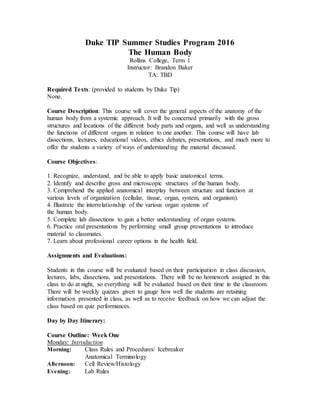
The Human Body Summer Course
- 1. Duke TIP Summer Studies Program 2016 The Human Body Rollins College, Term 1 Instructor: Brandon Baker TA: TBD Required Texts: (provided to students by Duke Tip) None. Course Description: This course will cover the general aspects of the anatomy of the human body from a systemic approach. It will be concerned primarily with the gross structures and locations of the different body parts and organs, and well as understanding the functions of different organs in relation to one another. This course will have lab dissections, lectures, educational videos, ethics debates, presentations, and much more to offer the students a variety of ways of understanding the material discussed. Course Objectives: 1. Recognize, understand, and be able to apply basic anatomical terms. 2. Identify and describe gross and microscopic structures of the human body. 3. Comprehend the applied anatomical interplay between structure and function at various levels of organization (cellular, tissue, organ, system, and organism). 4. Illustrate the interrelationship of the various organ systems of the human body. 5. Complete lab dissections to gain a better understanding of organ systems. 6. Practice oral presentations by performing small group presentations to introduce material to classmates. 7. Learn about professional career options in the health field. Assignments and Evaluations: Students in this course will be evaluated based on their participation in class discussion, lectures, labs, dissections, and presentations. There will be no homework assigned in this class to do at night, so everything will be evaluated based on their time in the classroom. There will be weekly quizzes given to gauge how well the students are retaining information presented in class, as well as to receive feedback on how we can adjust the class based on quiz performances. Day by Day Itinerary: Course Outline: Week One Monday: Introduction Morning: Class Rules and Procedures/ Icebreaker Anatomical Terminology Afternoon: Cell Review/Histology Evening: Lab Rules
- 2. Tuesday: Histology/Integumentary Morning: Mitosis/Meoisis (and other tissues) Lab Afternoon: Integumentary System/Skin Disorders Evening: Ethics Debate with Integumentary System Wednesday: Muscle/Bones Morning: Muscle Anatomy/Reflex Lab Afternoon: Skeletal System Evening: Review/ Talk about Presenations Thursday: Research Morning: Research Bone/Muscle Presentations Afternoon: Psychology with Rubi – Ethics Debate Evening: Ethics Debate Friday: Dissections Morning: Cranial Nerves/ Nervous System/Eye Anatomy Afternoon: Sheep’s Brain and Cow’s Eye Dissection Saturday: Quiz Morning: Week 1 Quiz/Guest Speaker Course Outline: Week Two Monday: Respiratory System Morning: Respiratory System/Disorders Afternoon: Exercise Physiology Evening: Build a Lung Activity Tuesday: Digestive System Morning: Digestive System Afternoon: Macronutrients/Macronutrients/Metabolism Evening: Nutrition case studies Wednesday: Cardiovascular Morning: Cardiac System/Ethics Debate Afternoon: Heart Rate/Blood Pressure Activity. EKG sheets Evening: Blood Type Activity Thursday: Nervous System/Endocrine System Morning: Collaborate with CSI class/ Brain Games Afternoon: Endocrine System Evening: TOPIC AND ACTIVITIES
- 3. Friday: Dissection Morning: Fetal Pig Dissection Afternoon: Review for Quiz Saturday: Quiz Morning: Quiz/ Jobs in Healthcare Course Outline: Week Three Monday: Uniary System Morning: Kindney Anatomy Afternoon: Diabetes Discussion/Diabtetes Evening: Tuesday: Research Morning: Libaray for Presenations Afternoon: Presenations Evening: Organ System Debate Wednesday: Genetics Morning: Genetics Afternoon: Punnet Square and Genetics Lab Evening: Review Game Thursday: Ethics Morning: Into to Medical Ethics Afternoon: Ethics Debates/ Case Study Evening: Brain Games Friday: Human Body Exhibit Morning: Field Trip Afternoon: Review Course with Game Saturday: Parent Conferences